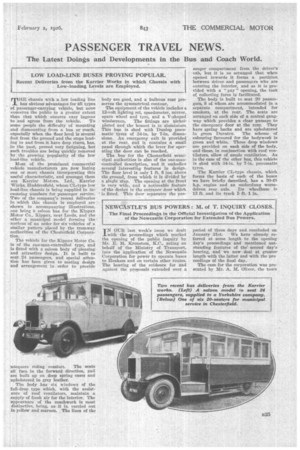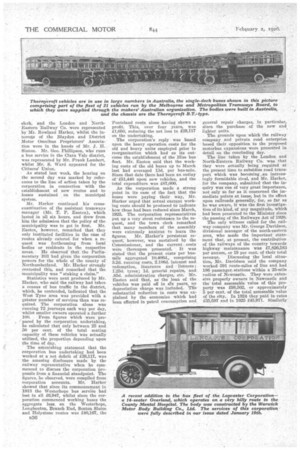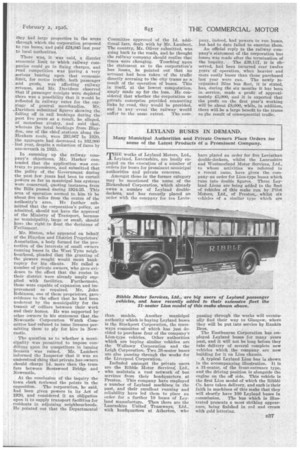NEWCASTLE'S BUS BUS POWERS : M. of T. INQUIRY CLOSES.
Page 19

Page 20

Page 21

If you've noticed an error in this article please click here to report it so we can fix it.
• The Final Proceedings in the Official Investigation of the Application • of the Newcastle Corporation for Extended Bus Powers.
IN OUR last week's issue we dealt with the proceedings which marked the opening of the public inquiry by Mr. E. M. Kronstam,. K.C., acting on behalf of the Ministry of Transport, into the application of the Newcastle Corporation for power to operate buses to Hexham and on certain other routes. The hearing of the evidence for and against the proposala extended over a
period of three days and concluded on January 21st. We have already referred at some length to the opening day's proceedings and rrientioned outstanding features of the second day's hearing, and we now deal at greater length with the latter and with the pro ceeding,a of the final day.
The case for the corporation was presented by Mr. A. M. Oliver, the town clerk, and the London and NorthEastern Railway Co. were represented by Mr. Rowland Harker, whilst the interests of the BIaytIon and District Motor Omnibus Proprietors' Association were in the hands of Mr. 1. H. Sinton. Mr. Geo. Phillipson, who runs a bus service in the Clara Vale district, was represented by Mr. Frank Lambert, whilst Mr. S. Ward appeared for the Citizens' Union.
As stated last week, the hearing on the second day was marked by references to the line of action taken by the corporation in connection with the establishment of new routes and to losses sustained on the municipal
system.
Mr. Harker continued his crossexamination of the assistant tramways manager {Mr. T. P. Easten), which lasted in all six hours, and drew from him the admission that the policy of the municipality was to get in first. Mr. Easten, however, remarked that they only instituted facilities in the case of routes already catered for when a request was forthcoming from local bodies or residents in the respective areas. He observedthat the Parliamentary Bill had given the corporation powers for the whole of the county of Northumberland. Mr. Harker strongly contested this, and remarked that the municipality was " staking a claim."
Statistics were next produced by Mr. Harker, who said the railway had taken a census of bus traffic in the district. which, he contended, indicated that the West Tyne area was provided with a greater number of services than was required. The corporation alone was running 72 journeys each way Per day, whilst smaller owners operated a further
100. From figures which were prepared by the corporation undertaking, he calculated that only between 25 and 50 per cent, of the total seating capacity of these vehicles was actually utilized, the proportion depending upon the time of day.
The astonishing statement that the corporation bus undertaking had been worked at a net deficit of £39,117, was the amazing disclosure made by the railway representative when he commenced to discuss the corporation Proposals from a financial standpoint. The figures, he observed, were compiled from corporation accounts. Mr. Harker showed that since its commencement in 1913 the Westerhope bus service had lost in all £6,947, whilst since the corporation commenced working buses the aggregate loss, on the Westerhope, Longbenton, Branch End, Seaton Sluice and Holystone routes was £40,167, the
B36 Ponteland route alone having shown a profit. This, over four years, was £1,050, reducing the net loss to £39,117 on the undertaking.
The corporation's reply was based upon the heavy operation costs for the old and heavy units employed prior to reorganization which had as its outcome the establishment of the Blue bus fleet. Mr. Easten said that the working costs of the old buses up to March last had averaged 13d. per bus-mile. Since that date there had been an outlay of •£51,446 upon new vehicles, and the total expenditure was 187,000. , As the corporation made a strong point in its case of the fact that the buses were paying their way, Mr. Harker urged that actual current working costs should be produced to indicate how these had been reduced since March, 1925. The corporation representatives put up a very stout resistaxce to the request, and the town clerk remarked that many members of the assembly were extremely anxious to learn the
figures. Mr. Harker's persistent request, however, was sustained by the Commissioner, and the current costs were thereupon presented. It was stated that the present costs per busmile aggregated 10.406d., comprising 5.2d. running casts, 2.106d. intexast and redemption, insurance and licences ; 1.25d. tyres; id. general repairs, and.854. administration charges, etc. Mr. Easten said that, as the loan of the vehicles was paid off in six years, no depreciation charge was included. Tile substantial reduction in costs was explained by the economies which had been effected in petrol consumption and
general repair charges, in particular, since the purchase of the new and lighter units.
The grounds upon which the railway company and private road enterprise based their opposition to the proposed motorbus expansions were presented in detail on the concluding day.
The line taken by the London and North-Eastern Railway Co. was that they were actually being required at the present time to subsidize road transport which was becoming an increasingly formidable rival, and Mr. Harker, for the company, submitted that the inquiry was one of very great importance, not only so far as it concerned the immediate points at issue, but in its effect upon railroads generally, for, so far as he was aware, it was the first investigation of its kind, of any magnitude, which had been presented to the Minister since the passing of the Railways Act of 1920.
The only witness called for the railway company was Mr. George Davidson, divisional manager of the north-eastern area, who made the important statement that, at present, the contribution of the railways of the country towards highway maintenance was £7,826,583 per annum, or 19 per cent, of their total revenue. Discussing the local situation, Mr. Davidson said the company worked 391 route-miles of line and had 186 passenger stations within a 25-mile radius of Newcastle. They were extensive property owners in Newcastle and the total assessable value of this property was £98,502, or approximately 5 per cent, of the total assessable value of the city. In 1924 they paid in rates £35,597 and in 1925 £45,971. Similarly
they had large properties in the areas through which the corporation proposed to run buses, and paid £24,04:5 last year to local authorities.
There was, it was said, a district economic limit to which railway companies could go in fixing charges, and road competition was having a very serious bearing upon that economic limit, for motor traffie. both passenger and goods, was affecting railway revenue, and Mr. Davidson observed that if passenger receipts were depleted there was a possibility that it would be reflected in railway rates for the carriage of general merchandise. Mr. -Davidson submitted figures showing the falling off in rail bookings during the past live years as a result, he alleged, of motorbus rivalry, and said that, whereas the total bookings from Blaydon, one of the chief stations along the Hexham route, were 293,067 in 1920, the aggregate had decreased to 162,900 last year, despite a reduction of fares by one-seventh in 1923.
In summing up the railway company's objections, Mr. Harker contended that the application was contrary to precedence, and Submitted that the policy of the Government during the past few years had been to curtail powers so far as municipal bus systems were concerned, quoting instances from the Bills passed during 1924-25. This area of operation seemed to him th he about five miles from the centre of the authority's area. He further submitted that the corporation's policy, as admitted, should not have the approval of the Ministry of Transport, because no municipality, large or small, should have the right to flout the decisions of Parliament.
Mr. Sinton, who appeared on behalf of the Blaydon and District Proprietors' Association, a body formed for the protection of the interests of small owners running buses in the West Tyne neighbourhood, pleaded that the granting of the powers sought would mean bankruptcy for his clients. He called a number of private owners, who gave evidence to the effect that the routes in their district were already amply supplied with facilities. Furthermore, these were capable of expansion and improvement as required. Mr, John Robinson, one of these proprietors, gave evidence to the effect that he had been undercut by the municipality for the transit of colliers between their work and their homes. He was supported by other owners in his statement that the Newcastle Corporation Watch Committee had 'refused to issue licences permitting them to ply for hire in Newcastle.
• The question as to whether a municipality was permitted to impose conditions upon its competitors in issuing licences was raised. Mr. Lambert informed the Inspector that it was an understood thing that private bus owners should charge id. more than the tram fare between Scotswood Bridge and Newcastle.
At the conclusion of the inquiry the town clerk reviewed the points in the opposition. The corporation, he said, had been given powers in its Act of 1920, and considered it an obligation upon it to supply transport facilities for residents in adjoining neighbourhoods. He pointed out that the Departmental Committee approved of the 1d. additional fare, dealt with by Mr. Lambert. The country, Mr. Oliver submitted, was going back to the roads, and he thought the railway company should realize that times were changing. Touching upon the statement as to the corporation's bus losses, he pointed out that no account had been taken of the traffic directly accruing to the city trams as a result of the operation of buses. This in itself, at the lowest computation, amply made up for the loss. He considered that whether the corporation or privaie enterprise provided connecting links by road, they would be provided, and in any event the railway would suffer to the same extent. The corn pauy, indeed, had powers to run buses, but had to date failed to exercise them.
An official reply to the railway company's statement of the corporation bus losses was made after the termination of
the inquiry. The £39,117, it is ohserved, had been incurred over twelve years of operation, when heavier and more costly buses than those purchased last year were run. The newly reorganized Blue bus fleet, it is stated, has, during the six months it has been in service, made a profit of approximately £3,000, and it is expected that the profit on the first year's working will be about 18,000, while, in addition, there will be a large benefit to the trams as the result of consequential traffic.






























